
Catalonia is an autonomous community of Spain, designated as a nationality by its Statute of Autonomy. Most of its territory is situated on the northeast of the Iberian Peninsula, to the south of the Pyrenees mountain range. Catalonia is administratively divided into four provinces or eight vegueries (regions), which are in turn divided into 42 comarques. The capital and largest city, Barcelona, is the second-most populous municipality in Spain and the fifth-most populous urban area in the European Union.

The recorded history of the lands of what today is known as Catalonia begins with the development of the Iberian peoples while several Greek colonies were established on the coast before the Roman conquest. It was the first area of Hispania conquered by the Romans. It then came under Visigothic rule after the collapse of the western part of the Roman Empire. In 718, the area was occupied by the Umayyad Caliphate and became a part of Muslim ruled al-Andalus. The Frankish Empire conquered northern half of the area from the Muslims, ending with the conquest of Barcelona in 801, as part of the creation of a larger buffer zone of Christian counties against Islamic rule historiographically known as the Marca Hispanica. In the 10th century the County of Barcelona became progressively independent from Frankish rule.
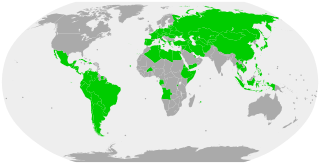
A civil code is a codification of private law relating to property, family, and obligations.
The Generalitat de Catalunya, or the Government of Catalonia, is the institutional system by which Catalonia is self-governed as an autonomous community of Spain. It is made up of the Parliament of Catalonia, the President of the Government of Catalonia, and the Executive Council of Catalonia. Its current powers are set out in the Statute of Autonomy of Catalonia of 2006.
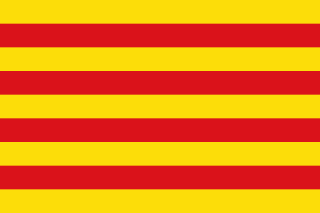
Catalan nationalism promotes the idea that the Catalan people form a distinct nation and national identity. A related term is Catalanism, which is more related to regionalism and tends to have a wider meaning, most people who define themselves as Catalanist do not necessarily identify as Catalan nationalists.

The Catalan independence movement is a social and political movement which seeks the independence of Catalonia from Spain.
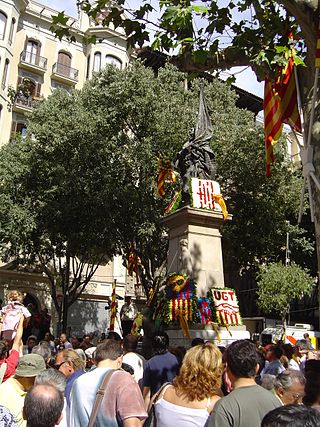
The National Day of Catalonia, also known as the Diada, is a day-long festival in Catalonia and one of its official national symbols, celebrated annually on 11 September. It is one of the public holidays in Catalonia.

The Parliament of Catalonia is the unicameral legislature of the autonomous community of Catalonia. The Parliament is currently made up of 135 members, known as deputies, who are elected for four-year terms or after extraordinary dissolution, chosen by universal suffrage in lists of four constituencies, corresponding to the Catalan provinces. The Parliament building is located in Ciutadella Park, Barcelona.
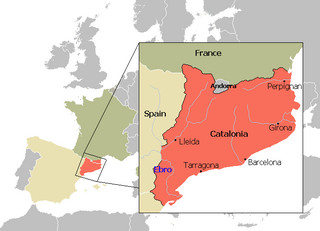
The Principality of Catalonia was a medieval and early modern state in the northeastern Iberian Peninsula. During most of its history it was in dynastic union with the Kingdom of Aragon, constituting together the Crown of Aragon. Between the 13th and the 18th centuries, it was bordered by the Kingdom of Aragon to the west, the Kingdom of Valencia to the south, the Kingdom of France and the feudal lordship of Andorra to the north and by the Mediterranean Sea to the east. The term Principality of Catalonia was official until the 1830s, when the Spanish government implemented the centralized provincial division, but remained in popular and informal contexts. Today, the term Principat (Principality) is used primarily to refer to the autonomous community of Catalonia in Spain, as distinct from the other Catalan Countries, and usually including the historical region of Roussillon in Southern France.

The Palace of the Generalitat of Catalonia is a historic palace in Barcelona, Catalonia, Spain. It houses the offices of the Presidency of the Generalitat de Catalunya. It is one of the few buildings of medieval origin in Europe that still functions as a seat of government and houses the institution that originally built it.
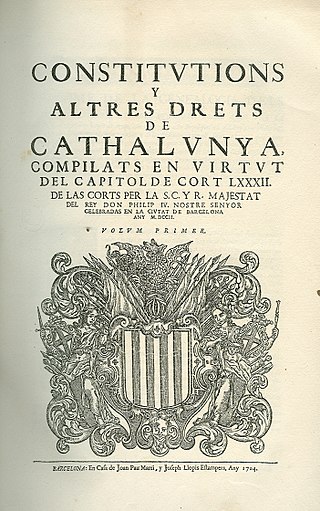
The Catalan constitutions were the laws of the Principality of Catalonia promulgated by the Count of Barcelona and approved by the Catalan Courts. The Corts in Catalan have the same origin as courts in English but instead meaning the legislature. The first constitutions were promulgated by the Corts of 1283. The last ones were promulgated by the Corts of 1705. They had pre-eminence over the other legal rules and could only be revoked by the Catalan Courts themselves. The compilations of the constitutions and other rights of Catalonia followed the Roman tradition of the Codex.

A vegueria, plural vegueries, is one of eight regional divisions of Catalonia, following the regional plan of Catalonia. Each vegueria is further divided into comarques and municipalities, with the exception of the Aran Valley, considered a "unique territorial entity".

The Usages of Barcelona were the customs that form the basis for the Catalan Constitutions. They are the fundamental laws and basic rights of Catalonia, dating back to their codification in the twelfth century.
The Statute of Autonomy of Catalonia is a constitutional law defining the region of Catalonia as an autonomous community within the Kingdom of Spain. It was promulgated on 18 September 1979. It is one of seventeen such statutes granted, in various forms and capabilities, to the different autonomous communities of Spain since the Spanish transition to democracy of the 1970s. On 18 June 2006 a referendum altering the statute to expand the authority of the Catalan government was approved; it became effective on 9 August 2006.

The military history of Catalonia began in the thirteenth century, with the first exploits of the armies under the orders of Catalan rulers and lasting until today, where Catalan soldiers are integrated into international forces.

The Library of Catalonia is the Catalan national library, located in Barcelona, Catalonia, Spain. The primary mission of the Library of Catalonia is to collect, preserve, and spread Catalan bibliographic production and that related to the Catalan linguistic area, to look after its conservation, and to spread its bibliographic heritage while maintaining the status of a center for research and consultation.

The following outline is provided as an overview of and topical guide to Catalonia:

The Catalan Courts or General Court of Catalonia were the policymaking and parliamentary body of the Principality of Catalonia from the 13th to the 18th century.

The Statute of Autonomy of Catalonia of 1932, also called the Statute of Núria, was the first implemented statute of autonomy for Catalonia, officially providing self-government to Catalonia for the first time in more than 200 years. The Statute was promoted by the then acting President of the Generalitat, Francesc Macià and approved in a referendum by 99% of Catalan voters. The draft Statute was completed on 20 June 1931 in Núria and finally approved in the Spanish Parliament on 9 September 1932. It was implemented until the occupation of Catalonia by the Nationalist Army during the last stages of the Spanish Civil War, in 1939.

National Day for Yes was a gathering in Barcelona on 11 September 2017, the National Day of Catalonia, in support of Catalan independence. It was organized by the Catalan National Assembly (ANC), the main civil society organisations behind the massive pro-independence demonstrations held since 2012.

















